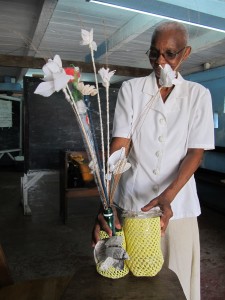
Kenzena Romao, though visually impaired for almost 13 years, has never allowed her disability to dampen her spirit.
“I have a passion for teaching,” she revealed in an interview with Guyana Times Sunday Magazine. “I have been teaching for almost 40 years now. I used to teach at commercial schools. Throughout my teaching career, I have met students who were slow learners, and I was able to help them be successful academically. I credit my grandmother who was very instrumental in instilling in me a love for teaching, and helped me both academically and spiritually.”
For 13 years, Kenzena’s programme, Amazing Grace Mission, has focused on school dropouts and slow learners. A subsidiary of the mission is the New Foundation Initiative, a non-governmental organisation that offers remedial courses for youths and adults. The organisation’s literacy programme includes craft, reading, mathematics and other subjects.
Kenzena recalled that her mission started as a small Sunday school group at her home and grew into a flourishing organisation, with classes being held at the New Scientific Church on Hadfield Street, Georgetown for the past three years.
“My technique is to separate them into groups, assessing their abilities because each individual is different. I first want to see how much they know, so I would give them a book to read to determine that. We focus mainly on reading because without this you cannot understand anything else. Then we move on to writing. That’s why we keep our numbers to a minimum, just over 20 students, to conduct one-on-one sessions with them. This is also more manageable for us,” she noted.
Kenzena’s mission is to integrate school dropouts back into the school system. She teaches them the alphabet – which they also have to recite backwards – and challenges them with spelling and math problems. After they have successfully completed the 6-month programme, they are enrolled at St Barnabas Special School.
“These techniques have been effective because I have personally learnt and developed these over the years of my teaching career. Unfortunately, due to my illness I am not able to do as much as I use to do, but I don’t allow it to discourage me. For those students who have moved on to St Barnabas, we keep in contact with them to track their progress,” she disclosed.
With regard to the funding of her programmes, the humanitarian said she does not “waste time” running around seeking sponsorship, and so whatever little she has she invests in her students. She was tired of being pushed around, and decided to just focus on her programme.
“Everything is funded by myself and other members. I’m not going to waste time running behind people to sponsor, and I don’t have to wait on that to help these ones. Back in my days there were some, like my grandmother, who would gather the community children to teach them. They didn’t need sponsorship to do it, and it’s the same thing I’m doing. Also, in my days, the church played an important part in educating children, whether spiritually or academically. If this continues our society will be a different place,” Kenzena maintained.
She said it has so far been a rewarding life and she is not tired yet. She believes her calling is a God-given one, and feels very blessed to be able to help others at such an old age. She also noted that her efforts have kept her active – physically and mentally.
“I used to cry a lot when I got ill,” she confessed, “because I couldn’t do as much as I used to, but with encouragement from the children and others, I was able to keep going. I also learnt a lot from teaching these children and it has kept me alive.
And so my encouragement is to never allow a disability to get you down. Rather, use it as a driving force to improve yourself and help others. Pray and have faith. I urge children to read as much as they can, and urge parents to encourage their children to read more. We live by our motto, ‘Read more, learn more, be literate’,” Kenzena declared.



